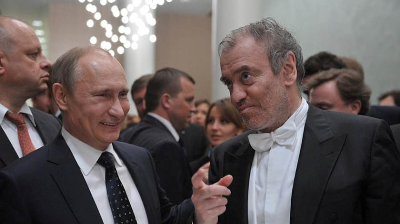
© https://symphony.org
Очікуване повернення Валерія Гергієва, одного з найвідоміших диригентів сучасності й водночас публічного симпатика режиму Путіна, спричинило гостру політичну та суспільну напругу в Італії. Його виступ, запланований на 27 липня 2025 року в Королівському палаці Казерти в межах фестивалю Un’Estate da Re, став об’єктом критики на найвищому рівні — як у Римі, так і в Брюсселі. Головною опоненткою виступу стала віцепрезидентка Європарламенту Піна Пічєрно (Democratici), яка публічно закликала губернатора Кампанії Вінченцо Де Луку виключити Гергієва з афіші: «Ми не можемо фінансувати з коштів платників податків людину, яка відкрито підтримує авторитарний режим, відповідальний за війну в Європі». До неї долучилася Олександра Матвійчук, українська правозахисниця та лауреатка Нобелівської премії миру, яка назвала рішення допустити виступ «не нейтральністю, а лицемірством». Антипутінська коаліція Europa Radicale заявила про готовність протестувати безпосередньо на концерті, назвавши запрошення Гергієва "інституційною безвідповідальністю" та "індульгенцією для російського імперіалізму". Єврокомісія в особі речниці з питань культури Гленна Мікаллефа наголосила: «Європейські сцени не повинні ставати трибуною для митців, які підтримують агресію в Україні. Ми закликаємо до солідарності з демократичними цінностями».
Губернатор Кампанії Де Лука захистив свій вибір, назвавши концерт "жестом культурної дипломатії" та наголосивши, що "ми не повинні змішувати мистецтво з геополітикою".
Його підтримав сенатор від партії Italia Viva Іван Скальфаротто, який застеріг проти "мистецької цензури", що "наближає нас до тих, з ким ми боремось". Представник Fratelli d’Italia Альфредо Антоніоцці пішов ще далі, заявивши, що "заборонити Гергієва — це як заборонити Достоєвського".
Востаннє Гергієв виступав в Італії 23 лютого 2022 року — напередодні повномасштабного вторгнення Росії в Україну. Уже наступного дня його було усунуто з диригентських посад у Teatro alla Scala, Мюнхенській філармонії, Wiener Philharmoniker та Carnegie Hall — через відмову публічно засудити війну. Попри це, в Казерті він знову вийде на сцену — разом з оркестром театру Верді з Салерно та солістами Маріїнського театру. У програмі — твори Верді, Чайковського та Равеля. І хоча концерт не скасували, питання залишається відкритим: де проходить межа між свободою мистецтва й моральною відповідальністю під час війни?
Putin Ally Gergiev Set to Perform in Italy Amid Mounting Protests
The anticipated return of Valery Gergiev — one of the most prominent conductors of our time and an outspoken supporter of Vladimir Putin — has ignited sharp political and social tensions in Italy. His concert, scheduled for 27 July 2025 at the Royal Palace of Caserta as part of the Un’Estate da Re festival, has drawn criticism from the highest political levels in both Rome and Brussels. The most vocal opponent has been Pina Picierno, Vice President of the European Parliament (Democratic Party), who publicly urged Campania Governor Vincenzo De Luca to remove Gergiev from the lineup: “We cannot use taxpayers’ money to pay someone who openly supports an authoritarian regime responsible for war in Europe.” She was joined by Oleksandra Matviichuk, Ukrainian human rights lawyer and Nobel Peace Prize laureate, who condemned the decision as "not neutrality but hypocrisy." The anti-Putin group Europa Radicale also announced plans to protest at the concert itself, describing Gergiev’s invitation as “institutional irresponsibility” and a “license for Russian imperialism.”EU cultural spokesperson Glenn Micallef reiterated the Commission’s position: “European stages should not be platforms for artists who support the aggression in Ukraine. We call for solidarity with democratic values.” While the Commission clarified that the concert is being funded by the Campania regional budget rather than EU funds, the controversy surrounding its political implications remains unresolved. Governor De Luca defended the decision, calling the event "an act of cultural diplomacy" and insisting that "we must not confuse art with geopolitics." Backing him was Ivan Scalfarotto, senator from Italia Viva, who warned against artistic censorship: “If we choose to fight tyranny by censoring music and art, we risk becoming dangerously similar to those we oppose.” Alfredo Antoniozzi, MP from the right-wing Fratelli d’Italia, went even further, claiming: “Banning Gergiev is like banning Dostoevsky. He is simply a great artist. If Russians are to be punished for the acts of their president, then we are endorsing cultural genocide.”
Gergiev last performed in Italy on 23 February 2022, just hours before Russia’s full-scale invasion of Ukraine. The following day, he was removed from key posts at La Scala, the Munich Philharmonic, the Vienna Philharmonic, and Carnegie Hall after refusing to publicly denounce the war. Now, he is set to return to the Italian stage — joined by the Verdi Theatre Philharmonic Orchestra of Salerno and soloists from the Mariinsky Theatre. The programme includes works by Verdi, Tchaikovsky, and Ravel. Although the concert has not been cancelled, the debate continues to divide public opinion and policymakers alike.
Where is the line between freedom of artistic expression and moral responsibility during wartime?
183